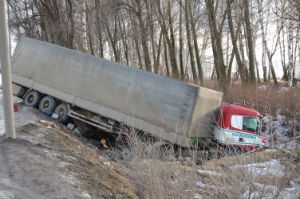 Anyone that has held a commercial driver's license (CDL) and operated an 18-wheeler probably has an innate understanding of how crucial it is to get proper rest before hitting the road. In fact, many agencies have dedicated large amounts of research toward how sleep deprivation can render serious danger toward truck drivers, as well as other motorists. The National Institute of Health (NIH) published an intensive study that examined the physiological effects of sleep deprivation on long-haul truck drivers. Using a focus group of 20 male truck drivers, researchers were able to conclude that longer truck routes often meant a deficient amount of rest and increased fatigue.
Anyone that has held a commercial driver's license (CDL) and operated an 18-wheeler probably has an innate understanding of how crucial it is to get proper rest before hitting the road. In fact, many agencies have dedicated large amounts of research toward how sleep deprivation can render serious danger toward truck drivers, as well as other motorists. The National Institute of Health (NIH) published an intensive study that examined the physiological effects of sleep deprivation on long-haul truck drivers. Using a focus group of 20 male truck drivers, researchers were able to conclude that longer truck routes often meant a deficient amount of rest and increased fatigue.
Find out how drug abuse affects truck drivers as it becomes a pandemic in NY: https://banvillelaw.com/truck-driver-drug-abuse/
Lack of sleep and driving is never a good combination. However, it is important to understand why it is so dangerous for truck drivers. Here is a list of specific ways that sleep deprivation while driving a truck can wreak havoc on the roads.
Having dull reflexes and hampered mental clarity while driving is an accident waiting to happen. According to the Center of Disease Control (CDC), sleep deprivation decreases alertness and reduces an individual's reaction time. This can impair judgment and motor skills, both vital components for safe driving - particularly when someone is operating a large vehicle such as an 18-wheeler.
The National Highway Traffic Safety Administration (NHTSA), which partially monitors truck driving federal laws and requirements, roughly estimates that 2.5 percent of fatal road accidents are due to sleep-deprived drivers and commercial truck drivers are at the top of the list. However, the agency considers that percentage to be lower than the actual amount of damage caused by sleep deprivation and truck driving. Based on NHTSA findings, the true number of accidents caused by lack of sleep extends into the thousands.
One medical study estimates that 20 percent of all adults are sleep deprived and that truck drivers have an even higher rate than that average. This puts truck drivers at an increased risk of causing road accidents. Due to the size of an 18-wheeler truck, this also increases the likelihood that many of the accidents will be fatal.
 In fact, the National Transportation Safety Board (NTSB) estimates that for every truck driver that is killed during a sleep-deprivation related road accident, another three to four fatalities are included. Sleep apnea is also a serious issue. Sleep apnea is a condition where an individual stops breathing for a period of time while sleeping. This affects the body's ability to get restful sleep that is conducive for operating a large vehicle at optimal capacity. According to federal and medical studies, 8 to 15 percent of commercial truck drivers have sleep apnea. So, if someone driving a truck is already sleep deprived, and happens to suffer from sleep apnea, the sleep-deprivation issue is only further compounded.
In fact, the National Transportation Safety Board (NTSB) estimates that for every truck driver that is killed during a sleep-deprivation related road accident, another three to four fatalities are included. Sleep apnea is also a serious issue. Sleep apnea is a condition where an individual stops breathing for a period of time while sleeping. This affects the body's ability to get restful sleep that is conducive for operating a large vehicle at optimal capacity. According to federal and medical studies, 8 to 15 percent of commercial truck drivers have sleep apnea. So, if someone driving a truck is already sleep deprived, and happens to suffer from sleep apnea, the sleep-deprivation issue is only further compounded.
When a truck driver is at fault for a motor vehicle injury or fatality, it opens up the possibility of a lawsuit. Whether the plaintiff is the injured party or survivor of someone killed during an accident, they can pursue claims against the truck driver's company, or the individual truck driver (particularly if the truck driver is an owner-operator). While many companies carry insurance to absorb financial damages related to these type of lawsuits, it still elicits a fiscal loss. Additionally, this could also cost the individual truck driver their job and commercial driver's license, taking away his or her ability to provide for their own family.
Texting and driving isn't just a problem with cars, read more: https://banvillelaw.com/man-hit-by-texting-trucker/